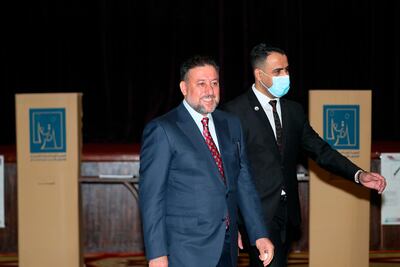A hand grenade was tossed into the office of a Sunni politician in Baghdad’s south-western neighbourhood of Sayyidiyah, he and a security official said.
Abdul-Karim Abtan Al Jubouri told The National he was not at his office when the grenade exploded and no casualties were reported.
Mr Al Jubouri did not accuse any group. He demanded an immediate investigation by the government.
He is affiliated to the Taqadum party, led by Parliament Speaker Mohammed Al Halbousi.
The attack late on Saturday was the latest in a wave of assaults against offices of the main two Sunni parties in the capital amid rising tension over the formation of Iraq's next government.
Shortly before dawn on Friday, militants on motorcycles attacked the offices of the Taqadum party and the Azim coalition headed by tycoon Khamis Al Khanjar, another security official said.
In all three attacks, the buildings suffered only minor damage.
The identity of the attackers was not immediately clear and no group has yet claimed responsibility.

Friday’s attacks came hours after rockets were fired at the US Embassy inside Baghdad’s heavily fortified Green Zone where government offices and embassies are located.
Two rockets were intercepted while the third landed on a school near the embassy, a security official said.
No deaths were reported in the attack on Thursday evening, but a woman and a child were injured, the official said. No group claimed responsibility.
US assets in Iraq have faced frequent attacks from Iran-backed Shiite militias since the January 2020 killing of Iranian general Qassem Suleimani and Iraqi militia leader Abu Mahdi Al Muhandis in a US drone strike.

The attacks on the US Embassy and on party offices came as tension rises among Iraq's political rivals over the formation of a new government after the general election in October.
The Sadrist bloc, a political group sponsored by populist Shiite cleric Moqtada Al Sadr, emerged as the biggest group, with 73 seats, prompting an unsuccessful challenge of the election result by his Shiite rivals.
They include former prime minister Nouri Al Maliki, whose State of Law bloc won 33 seats, and the Iran-backed Fatah Alliance, which won 17 seats in the 329-member Iraqi Parliament.
Mr Al Sadr and the Co-ordination Framework, formed by State of Law, Fatah and other Shiite groups, have failed to reach consensus on the next government.
Sunni and Kurdish groups in parliament are siding with Mr Al Sadr, and his Shiite rivals have issued threats against them.


